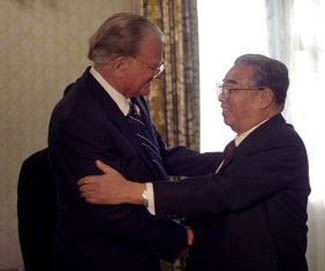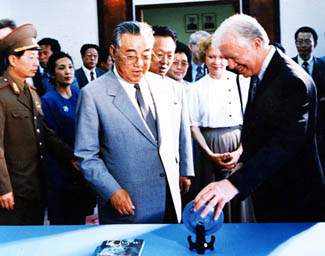By Mark Ellis

The notoriously closed “hermit kingdom” of North Korea ran into a problem in the late 1980s. They wanted to teach the history of various religions at their foremost university, but because they had done everything humanly possible to destroy religion, they couldn’t find anyone qualified to teach on the subject of Christianity.
“We have found someone to teach Buddhist studies, and someone to teach Confucius studies, but we can’t find anyone qualified to teach Christianity,” a North Korean official wrote in a letter to Dr. Dale Kietzman, then the executive vice-president of William Carey International University in Pasadena, California.
He and Dr. David Cho had sent a letter to Kim Il-Sung University in North Korea asking if an exchange program could be established between the two schools. It took several months, but they finally received a response.
When the communist regime was installed in 1948, there were 400,000 Christians in North Korea. Unleashing a reign of terror, the government tried to exterminate all religion, installing a Marxist dynasty ruled by Kim Il-Sung and his son. Most Christians fled to the south, were martyred, or went underground. Nearly every church building in the country was bulldozed.
It was no wonder the regime couldn’t find anyone to teach Christianity, but their need provided an opening for Kietzman, Dr. Cho, and Charles Wickman to visit North Korea in 1990.
After touring several days in the capital city of Pyongyang the visitors were told: “You should be prepared, because tonight you’re going to have dinner with a very, very, important person.”
“We were taken to a government guesthouse that evening after dark, and after dark in Pyongyang it’s very dark, because they don’t have many street lights. We couldn’t tell where they had taken us,” Dr. Kietzman recounts.
Kietzman and his party were ushered into a sizeable room, dominated by a large table. There were 20 people sitting on cushions around the table and Kietzman was seated next to the English-speaking ‘Vice-chairman of the Committee for Reconciliation and Reunification.’ “I asked him what this meant and he said, ‘Reconciliation is with the United States and reunification is north and south.’”
“After the chit-chat, he said, ‘We would like your advice. How do we impress upon the American people we’re not the bad people they think we are?’”
“Americans need to interact with people before they trust them,” Kietzman replied. “Why don’t you let tourists in and maybe there will be a change in attitude.”
“No, we’re not really ready for tourists,” the North Korean official replied.
“I said, ‘Well, then, you need to keep inviting key people.’ The official went on to explain they invited Ramsey Clark and Joan Baez in the past, but after they returned to the U.S. there was no change in relations.
Kietzman said if they really wanted to impress the American people they should invite a prominent Christian leader, because Christians are a major influence in the country.
“Who would you recommend?” the official asked.
“How about Billy Graham?” Dr. Kietzman suggested. Everyone at the table suddently was at rapt attention. They pulled out steno pads and began furiously taking notes. The officials looked at each other quizzically — most had never heard of Billy Graham.
“Oh I know who Billy Graham is,” volunteered Han Si Hae, former North Korean Ambassador to the United Nations during the Reagan administration.
At that time, Jeanne Kirkpatrick was Ronald Reagan’s ambassador to the U.N. “She invited me to hear Billy Graham speak at Madison Square Garden,” Hae said. “Well, we can take that under advisement…Who else should we invite?”
“Jimmy Carter,” Kietzman replied. He was the only other person Dr. Kitzman could think of in that moment.
“I also told him that in the U.S. the Bible is the most respected book, and every home has that book. I said if you could just teach the Bible as literature in your school system, the American people would think North Korea is all right.”
“Oh—we can do that,” Hae replied.
The next day Kietzman learned the North Korean dinner group reported directly to Kim Il-Sung and gave him a complete report of the previous night’s conversation. At the end of the meeting, Kim Il-Sung told his officials to make the arrangements for a Billy Graham visit.
When Kietzman arrived back home in the U.S., the North Koreans called him, and asked him to make sure Billy Graham would accept an invitation. A call was placed to Graham’s office in North Carolina.
God’s impeccable timing
“We don’t even have to ask Dr. Graham,” a member of the Graham organization said. “We just had a staff meeting and were discussing the places he still wants to go. In our meeting he said there is one country that he still wants to minister in—North Korea.”
When Graham’s wife, Ruth, was young, she attended school in Pyongyang, and this became a starting point for Graham to establish a connection. Unfortunately, Ruth Graham’s health would not allow her to accompany her husband.
On Graham’s historic first trip to North Korea, he had a 30-minute meeting with Kim Il-Sung. He was invited back a second time, and spent three hours alone with the communist leader. Kietzman is certain Billy Graham presented the gospel to Kim Il-Sung during their visit.
“I have no call to North Korea,” Kietzman says. “But when these things happen I feel I have to follow through.”
Meetings with Ronald Reagan and Jimmy Carter
Later, when a North Korean delegation visited the U.S., Dr. Kietzman took them to a Sunday morning service at Bel Air Presbyterian Church when the Reagans were in attendance. Along with then-pastor Don Moomaw, he facilitated a brief meeting between the North Koreans and Ronald Reagan.
“I wanted to show them the president attends church,” Kietzman says.
During the same period, Dr. Kietzman also received a call from the North Koreans attempting to reach Jimmy Carter. They were insistent about reaching Carter at 10:00 the next morning. Kietzman called the Carter Center in Atlanta and got a quick response from the ex-president.
“He wanted to know what this is all about,” Dr. Kietzman recalls. “He said, ‘I’ll talk to them, but it can’t be tomorrow at 10:00 in the morning, because I’ll be teaching Sunday school.”

Arrangements were made for Carter to speak to them the following day, however, which led to Jimmy Carter’s historic visit to North Korea with his wife Rosalynn as representatives of the Carter Center, in a quest to help defuse issues surrounding North Korea’s budding nuclear program – a controversy still alive today.
Beginning in 1946, Dr. Kietzman served in Mexico, Peru, and Brazil with Wycliffe Bible Translators and eventually became Wycliffe’s director for North America in the 1970s. He co-founded Wycliffe Associates, and also headed Every Home for Christ.
Later, he became a professor at William Carey International University and an elder statesman, facilitating the ministry goals of many Christian organizations.
Now slowing in retirement, he still has a big heart for the Totonaco tribe, a group he’s been assisting for 30 years. “We are a Barnabas to their efforts,” he says. As former president of Latin American Indian Ministries, he helped make resources available for Christian leaders in the group.
His gift of administration was recognized very early, when he was placed in increasingly important leadership roles within Wycliffe.
In these roles he often interacted with William Cameron Townsend, the founder of the organization. “He was a descendant of farmers,” says Kietzman. “What was surprising was his boldness. He could talk to any ambassador or president of a company. But he was never flashy, and never dressed like a diplomat.”
“His technique was always to ask for their help, not with anything difficult, but with something they could easily do, because that would build a friendship.”
Townsend would also invite people to eat with him. “During the meal he’d say, ‘It’s my custom to read from the scripture, because I need my spiritual food.’ So he’d pull out a pocket New Testament and open to John 17 or John 3. And he’d turn to the most important guest and ask if they would mind reading it. So this would always open the conversation to spiritual things.”
During a service leave from Wycliffe in 1973, Dr. Kietzman started Wycliffe Associates and arranged a U.S. tour for Brother Andrew, the Dutch Bible smuggler who was taking Bibles into Eastern Europe at the time.



